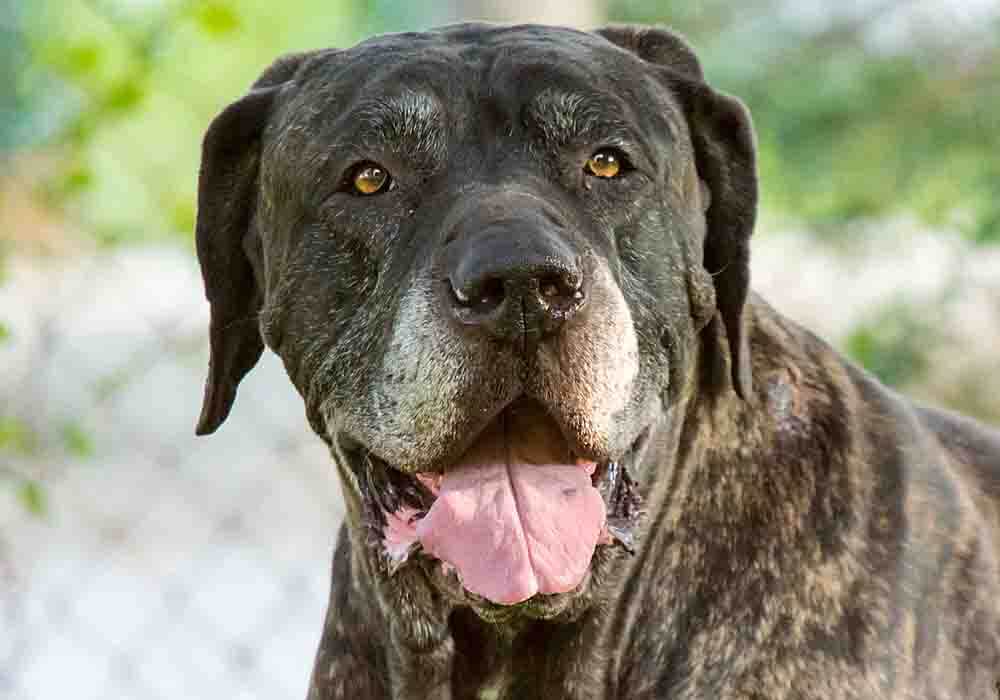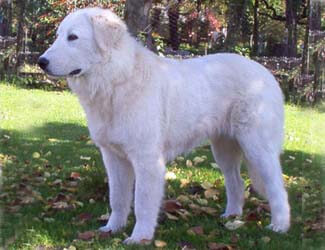6 Mastiff Breed Characteristics
You Should Know About
by Ken Alden
The Mastiff breed characteristics presented here highlight just a few of the many endearing traits Mastiffs have become known for which make them one of the most beloved and recognizable dog breeds.
Top 6 Mastiff Breed Characteristics...
Mastiffs are...
1. Highly Affectionate
2. They're Excellent with Kids
3. They Follow Their Noses And Have An Instinct To Hunt
4. Drooling is Inevitable When Excited, Nervous or Hungry
5. They're Fiercely Loyal
6. They Require Only Moderate Exercise
While some may be intimidated by their massive stature, they are gentle giants at heart. Mastiffs average up to around 220 pounds, so understanding how they operate and what motivates them as a breed is important so you can properly train them and keep them happy and healthy.
Want to learn more about these 6 Mastiff breed characteristics? We'll bet there's things you'll learn here that you've never known before. Read More Below...
Pro-tip: Ever try lifting a Mastiff? Their weight can hurt not only your back but their joints when they hop down from cars, sofas or even your bed. To protect your back and theirs check out the best Mastiff ramps on Amazon.com now.
Table Of Content - Jump To Links
Top Mastiff Breed Characteristics
Are Mastiffs Affectionate?
Are They Good With Kids?
Do Mastiffs Drool A Lot?
Are Mastiffs Loyal?
Do They Need Lots Of Exercise?

Are Mastiffs Affectionate?...Yes!
Mastiffs are gentle and love a good cuddle with their family members. There is a calming affection that comes with owning a Mastiff. Once you bond with your Mastiff and they settle into your home with you, they are fully devoted to you and love to show you every day.
Through their affection for you, they also possess an extreme amount of patience. Whether you left the house for 2 minutes or you were gone at work all day, or you had to leave them with a family member while you were on vacation – they will wait for you.
They want to be near you whenever they can, even if they have to wait for it. They have a long history as war dogs, hunters, and sadly in ancient times as fighters. They are a breed that dates back thousands of years. But some of their aggressive ancestors actually helped form them into a loving house pet in modern day.
It’s similar to adopting a stray--they are forever grateful and want nothing more than to show you love and gratitude every day. Mastiffs’ history of having to be an aggressor actually could play into their willingness and wanting to simply be a gentle companion to you.
While they were used as war dogs, it was not only because of their size and strength, it was because they were loyal and affectionate to their owners. They would do anything for them. This has always continued to be true, and now they are happy to be your loving companion and to find new ways to show you.
When they came up with the phrase “A dog is a man’s best friend”, it’s as if they have Mastiffs in mind, specifically.
Are Mastiffs Good With Kids?...Very Much So
I will start this with a caveat – Mastiffs are excellent with kids, but you should be aware when they are around toddlers. Although Mastiffs are some of the most loving and affectionate dogs you will ever know, they weigh 200 pounds!
The issue is your Mastiff could very easily accidentally cause harm to your little one. Especially if they are full grown. Mastiffs just want to love their families and be near them. They don’t always realize their full size and the impact it can have though.
Even something as simple as your Mastiff jumping up to say hi can be dangerous to a small child. Or even less threatening, a simple cuddle session where they rollover could be harmful to a very small child. So, while they are not aggressive or dangerous, they can still present a danger simply due to their size.
_______________________________________________
Pro Tip: Be sure to socialize your Mastiff puppy heavily when they are young. If you socialize them and teach them how to act around smaller children, it will help them make a more conscious effort to be gentle around children, once they are full-grown. Also, teach your kids the same. Teach them to be gentle in return, and not do anything to provoke overexcitement or a harsh reaction.
_______________________________________________
Mastiff’s make for great family dogs and they love to be around kids which is a great Mastiff breed characteristics. Their gentle nature and strong affection and loyalty for their families make them ideal pups for the kiddos. Not only will they have a best pal, but they will also have a 200-pound protector always watching over them.
They are also extremely tolerant and patient animals. So, if your child tries to mount him/her like a horse one too many times after the Mastiff is over it, they will still be patient and allow it to play out. Mastiffs want to be there as a protector, a friend, and a protector to the kids in their family.
They also can’t resist when a kid walks up, and they can be face-to-face for a good ole’ face licking.
Pro-tip: Mastiff anxiety, aggression, destructive chewing, jumping up, fearfulness, and other behaviors can be controlled with the right training program.
Here’s a great course that
addresses these issues along with many other dog training basics: Check it out now!
Mastiff Sense Of Smell...They Follow Their Noses
All dog breeds have certain characteristics that date back to their earliest ancestors. Some traits will slowly be bred out of them over time as dogs adapt and evolve, but some of the primal instincts inherent will remain.
For Mastiffs, their earliest ancestors were hunters. The modern-day Mastiff is considered to have an origin country of England after they were brought to ancient Britain around 500 B.C.E. They were great hunting dogs but also were trained to be war dogs, helping in combat.
While these giant beauties are now enjoying a much more relaxed and affectionate lifestyle, they still have that instinct to hunt and use their nose as one of their most powerful assets.
Hunting: If you have a fenced-in yard for your Mastiff, beware of small animals finding their way in. While they are gentle-natured and nonaggressive, they are also primal and follow their sense of smell wherever it may lead them. Simply put: you may get an unwanted “gift” that they drop off at the back porch from time to time.
Keep this in mind when you take your pup for a walk. Be sure you go through proper leash training for them. This will be a huge help when they are 220 pounds and smell a squirrel in a bush just off the side of the road.
What this means for you: Not only are their noses a powerful tool in hunting, they are driven by prey in their breeding. So, this means you will need to be diligent in training and enforcing positive habits when it comes to the furry critters in your neighborhood or around your dog’s favorite park.
Their instinct will be to pounce when they sniff these little guys out, so it will be up to proper training and a trusting bond between the two of you, to ensure your Mastiff doesn’t wipe out half the squirrel population.
Professions: Mastiffs, like German Shepherds or Bloodhounds, will be used from time to time by police and other law enforcement agencies. They are excellent resources for bomb-sniffing, findings drugs, or picking up the scent of either the victim or the suspect in a crime that leads them on a chase.
This is also a great way for Mastiffs who need a home, to be adopted. They will be trained and cared for by a law enforcement agent, and their skills will be utilized in a professional sense. This also goes back to their loyalty and willingness to please.
German Shepherds outrank them in their intelligence department which is why they are more heavily used. But the loyalty of a Mastiff goes a long way when you are training them.
________________________________________________
Fun Fact: Mastiff’s Can Sniff Out Disease: Mastiffs have been known to be able to sniff out diabetes, cancer, malaria, and Parkinson's in their owners. Each disease has certain elements that are not detectable by human scent, but dogs with a heightened sense of smell have this extraordinary ability. TODAY featured a great article about dogs that can sniff out many of these diseases.
________________________________________________
Do Mastiffs Drool Alot? Yes, Unfortunately
Mastiffs are majestic, ancient, beautiful, loving dogs…who love to drool. If you are a neat freak, a Mastiff may not be the dog for you. Many dogs will drool as a way to show their excitement or anticipation for food.
Other reasons for drooling can include being excited over other reasons such as your arrival back home after a long workday, or nervousness, such as when you pull up to the vet’s office and they recognize the smell. Some dogs are also known to drool when they are in the car that can be a mixture of those two feelings, but they may also be feeling a little car sick. mastiff breed characteristics
Mastiffs, specifically, are less capable of keeping the drooling limited due to the looseness of their lips. The shape of their mouths and those big floppy jowls produce a lot of drooling. For a dog that loves to show affection to their owners, and can smell their food coming from a mile away, this can be a bit intense sometimes.
If
you are cool with a little drool, then this won’t be an issue. But it is
something to consider if you like to keep a tidy house.
Learn more about which Mastiff breeds drool the most in our article dripping with helpful information!
__________________________________________________
Fun Fact: Speaking
of their size - in the 1700's they were often called "the Butcher's
Dog" because the butcher was pretty much the only person in town with
enough meat to keep these huge dogs satisfied. Mastiff owner’s past and
present can all relate to this.
___________________________________________________
Pro-tip: Mastiff's (and their owners) love dog crates…and for good reasons. Crates keep dogs from mischief while you're away, are perfect for house training, for traveling by car, and provide the dog a place to de-stress. Check out the best Mastiff crates on Amazon.com now.
Are Mastiffs Loyal? Very Much So
As
long as you properly raise your Mastiff in a loving household with
training, affection, and socialization, they will protect you and stay
loyal to you like no other. They are some of the best guard dogs you
will ever have, as well. Even though they do not have an aggressive
nature, they will turn a whole new side on if they see someone
threatening you, your family, or your home which is one of the Mastiff breed characteristics.

Also, consider the look of these beautiful beasts. While they may look adoringly at you, if they see an intruder, those eyes will flip a switch and that intruder will think twice before trying to take on a 200-pound dog, flexing their muscles, and showing their teeth.
We can’t say this often enough--making sure your Mastiff is properly socialized as a puppy is extremely important to this breed. Because they have such intense loyalty to you, and the sense to always have to protect you, they need to understand that strangers will come over sometimes. With this loyal nature, if they are not socialized as puppies, they may end up assuming any stranger is, in fact, a danger to you.
If they are properly trained and socialized while they are young, you will not see the fierceness from them unless there is clear and present danger. They will be able to understand the difference between a stranger entering their home that has a good nature who hugs you and walks in for your dinner party versus someone with a bad aura sneaking in the backdoor to cause harm.
When you have a larger dog, you have a larger responsibility. Socialization, training, and receiving positive affirmations and reprimanding as necessary will help them grow into a giant, but gentle protector. One that enemies should fear, but friends and family will be welcomed and loved by.
Do Mastiffs Need A Lot Of Exercise?...Only A Bit
This is one of the Mastiff breed characteristics that leaves people shocked. When you see a large, muscular dog, that is known as a hunting dog you assume that they will need to go on long runs, or hikes in the woods every day for extended periods.
While they do need daily mental and physical stimulation, they do not need the amount you would think. Their energy levels are fairly average, not being overly energetic or lethargic. But because they were originally bred as hunters, they do have an instinct to get outside, play, and be active.
According to the American Kennel Club, they will reap great benefits from daily walks of around a mile or two for adult Mastiffs, along with allowing time for free play. Both will activate their mental and physical needs. If you have trails around your house that pose different elements and scents for your Mastiff, they will love that additional challenge.
Always have them on a leash and make sure they are properly trained. Those powerful hunting noses will have a mind of their own, so it is crucial on your walks to be aware of this.
When they are puppies, you will want to ease them into exercise. Their joints and bones are growing rapidly, so you do not want to overexert them. Start with walks as short as a couple of blocks and limit their playtime. Make sure they get ample rest, along with their spirts of playtime that can extend over time.
Making it a part of their daily routine now and including activities that trigger all their senses, which will give them the stimulation they require. Because of their size, excessive running can cause them to overheat or damage their joints.
Large dogs such as Mastiffs are at risk for
bloat, which is a stomach disease that can become quite dangerous if not
properly attended to. According to PetMD,
a cause of this disease can be from too much play directly after
eating. So, beware of not just how you give your Mastiff exercise, but
also when you give them exercise.
Learn more about the exercise needs of a Mastiff in our excellent article.
__________________________________________________
Fun Fact: There
are ancient markings found in the mountains of Asia that show there may
have been Mastiff-like dogs as far back as 2500 B.C.E. These dogs were
slightly leaner and taller than the current-day Mastiff we know and
love.
__________________________________________________
mastiff breed characteristics
Mastiff Breed Characteristics...Some Final Thoughts
While there are always pros and cons to weigh in your decision over which dog is best for you, your family, and your living situation – you can be sure that Mastiffs are always going to be a loving, affection, and loyal addition to your family.
Make sure you understand all of the Mastiff breed characteristics and how they might affect your day to day life before
committing to welcoming one of these gentle giants into your home and
your life.
Return to the top of this Mastiff Breed Characteristics page

About the Author...
Ken Alden, a dedicated Mastiff owner for over eight years, is acclaimed for his expertise in care, grooming, and training. Read more About Me and my dog Shadow.
- Mastiff Guide Home ›
- Mastiff Dog Information ›
- Mastiff Breed Characteristics









